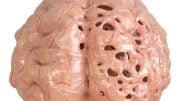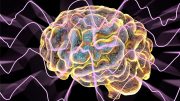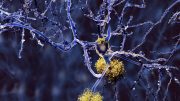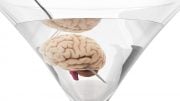
A study by Wake Forest University School of Medicine found that even modest alcohol consumption can expedite brain atrophy and amplify the formation of amyloid plaques, which are linked to Alzheimer’s disease. Using mouse models, researchers discovered that consistent alcohol exposure disrupted metabolism and raised blood sugar levels, increasing risks for other ailments, including type 2 diabetes and cardiovascular diseases.
A research study suggests that even modest alcohol consumption can hasten brain degeneration and amplify amyloid plaque formation, intensifying Alzheimer’s disease risks.
Alzheimer’s disease is the most common form of dementia, accounting for 60% to 80% of dementia cases, according to the Alzheimer’s Association. While current research suggests alcohol use disorder is a risk factor in Alzheimer’s disease, the impact alcohol use disorder has on Alzheimer’s disease pathology is an area of continued research.
In a preclinical study, scientists at Wake Forest University School of Medicine showed that even modest amounts of alcohol can accelerate brain atrophy, which is the loss of brain cells, and increase the number of amyloid plaques, which are the accumulation of toxic proteins in Alzheimer’s disease.
The study was published in the journal Neurobiology of Disease.
“These findings suggest alcohol might accelerate the pathological cascade of Alzheimer’s disease in its early stages,” said Shannon Macauley, Ph.D., associate professor of physiology and pharmacology at Wake Forest University School of Medicine.
The study was a collaboration led by Macauley and Jeffrey Weiner, Ph.D., professor of physiology and pharmacology at Wake Forest University School of Medicine, through the medical school’s Alzheimer’s Disease Research Center and Translational Alcohol Research Center.
Research Methodology and Discoveries
Using mouse models of Alzheimer’s disease-related pathology, researchers used a 10-week chronic drinking approach where mice were given the choice to drink water or alcohol, mimicking human behavior regarding alcohol consumption. They then explored how voluntary, moderate consumption of alcohol altered healthy brain function and behavior and whether it altered the pathology associated with the early stages of Alzheimer’s disease.
The researchers found that alcohol increased brain atrophy and caused an increased number of amyloid plaques including a greater number of smaller plaques, potentially setting the stage for increased plaque proliferation in later life.
Interestingly, researchers also noted that acute withdrawal of alcohol increased the levels of amyloid-beta, which is a key component of amyloid plaques that accumulate in Alzheimer’s disease.
Further analysis showed that chronic alcohol exposure poorly regulated brain and peripheral metabolism—another way to accelerate Alzheimer’s disease pathology. Macauley previously demonstrated that elevated blood sugar increases amyloid-beta and amyloid plaques. In the current study, researchers found that even moderate drinking caused elevations in blood sugar and markers of insulin resistance, which increases the risk not only for Alzheimer’s disease but also for other diseases such as type 2 diabetes and cardiovascular disease.
Implications of the Study
The study also found that moderate alcohol use altered anxiety and dementia-related behaviors.
“These preclinical findings suggest that even moderate consumption of alcohol can result in brain injury,” Macauley said. “Alcohol consumption may be a modifiable risk factor for Alzheimer’s disease and dementia.”
Reference: “Ethanol exposure alters Alzheimer’s-related pathology, behavior, and metabolism in APP/PS1 mice” by Stephen M. Day, Stephen C. Gironda, Caitlin W. Clarke, J. Andy Snipes, Noelle I. Nicol, Hana Kamran, Warner Vaughan, Jeffrey L. Weiner and Shannon L. Macauley, 16 December 2022, Neurobiology of Disease.
DOI: 10.1016/j.nbd.2022.105967
This study was supported by the National Institute on Alcohol Abuse and Alcoholism Grant No. P50AA026117, National Institute on Aging Grant P30AG072947, National Institute on Aging Grant No. R01AG068330, National Institute on Alcohol Abuse and Alcoholism Grant T32AA007565, National Institute on Aging Grant No. K01AG050719, BrightFocus Foundation Grant No. A20201775S, and grant from the Averill Foundation.








What about the 100 year old guy who attributes his longevity to a shot of whisky before bed time. I find it does help with sleep. But only 1oz. 1 shot.